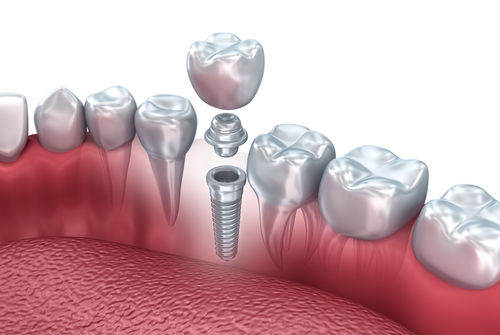Restorative dentistry focuses on repairing and restoring the function and aesthetics of damaged or missing teeth. At Liberia Dental, we offer a range of restorative dental treatments to help you regain a healthy, functional smile. Whether you need a simple filling or a complex restoration, our skilled dental professionals are here to provide the care you need.
What is Restorative Dentistry?
Restorative dentistry involves the diagnosis, prevention, and treatment of oral diseases and conditions that affect the teeth and supporting structures. The goal of restorative dentistry is to restore the function, health, and appearance of the teeth, ensuring a balanced and comfortable bite.
Common Restorative Dental Treatments
- Dental Fillings: Dental fillings are used to repair teeth that have been damaged by decay, fractures, or wear. The decayed or damaged portion of the tooth is removed, and the cavity is filled with a material that restores the tooth’s shape, function, and appearance. Common filling materials include composite resin, amalgam, and ceramic.
- Dental Crowns: Crowns are custom-made caps that cover and protect a damaged tooth. They restore the tooth’s shape, size, strength, and appearance. Crowns are typically made from durable materials such as porcelain, ceramic, metal, or a combination of these.
- Dental Bridges: Bridges are used to replace one or more missing teeth. They consist of artificial teeth anchored by crowns on adjacent natural teeth or dental implants. Bridges restore the function and aesthetics of your smile, preventing adjacent teeth from shifting out of position.
- Dental Implants: Dental implants are a permanent solution for replacing missing teeth. Implants consist of titanium posts surgically placed into the jawbone, which serve as artificial tooth roots. They provide a stable foundation for crowns, bridges, or dentures, offering a natural-looking and long-lasting solution.
- Root Canal Therapy: Root canal therapy is necessary when the pulp of a tooth becomes infected or damaged. This treatment involves removing the infected tissue, cleaning and disinfecting the root canals, and sealing the tooth to prevent further infection. A crown is often placed over the treated tooth to restore its strength and function.
- Dentures: Dentures are prosthetic devices designed to replace missing teeth and surrounding tissues. They are custom-made to fit comfortably in your mouth and can be easily removed for cleaning and maintenance. Dentures come in two main types: complete dentures and partial dentures.
The Benefits of Restorative Dentistry
- Restoration of Function: Restorative dental treatments restore the normal function of damaged or missing teeth, allowing you to bite, chew, and speak properly.
- Improved Aesthetics: Restorative dentistry can significantly improve the appearance of your smile by repairing damaged teeth and replacing missing teeth. Modern restorative materials are designed to blend seamlessly with your natural teeth, providing a natural-looking result.
- Prevention of Further Damage: Restorative treatments help prevent further damage to your teeth and supporting structures. For example, filling a cavity prevents bacteria and food particles from entering the tooth, reducing the risk of further decay and damage.
- Enhanced Comfort: Restorative dentistry can alleviate pain and discomfort caused by damaged or missing teeth. Treatments such as root canal therapy and dental crowns can relieve tooth pain and restore comfort to your bite.
- Long-Term Oral Health: By addressing dental issues promptly and effectively, restorative dentistry helps maintain long-term oral health. Restored teeth are more resilient and less prone to future problems, ensuring a healthier smile.
The Restorative Dentistry Process
The process of undergoing restorative dental treatments at Liberia Dental typically involves several steps:
- Initial Consultation: Your restorative journey begins with a consultation. During this visit, your dentist will examine your teeth, take X-rays, and discuss your dental concerns and goals. Based on the examination and diagnostic information, your dentist will create a personalized treatment plan.
- Treatment Planning: The treatment plan outlines the recommended restorative treatments and timeline. This plan will be tailored to your specific needs and goals, ensuring that you achieve the desired results.
- Preparation: Depending on the treatments you choose, your dentist may need to prepare your teeth. For example, if you are getting a crown, the damaged portion of the tooth will be removed, and the tooth will be shaped to accommodate the crown.
- Treatment: The restorative treatments will be performed according to the treatment plan. Your dentist will ensure that each step is carried out with precision and care, providing you with the highest quality results.
- Follow-Up: After completing your restorative treatments, your dentist will schedule follow-up appointments to monitor your progress and ensure that you are satisfied with the results. Regular dental visits and good oral hygiene are essential for maintaining your restored smile.
Choosing the Right Restorative Dentist
Selecting the right restorative dentist is crucial for achieving the best results. Here are some tips for choosing a restorative dentist:
- Experience and Expertise: Look for a dentist with extensive experience and expertise in restorative dentistry. Check their credentials, training, and certifications to ensure they are qualified to perform the treatments you need.
- Portfolio of Work: Ask to see before-and-after photos of previous patients who have undergone similar treatments. This will give you an idea of the dentist’s skills and the quality of their work.
- Patient Reviews: Read reviews and testimonials from other patients to get an idea of their experiences with the dentist and the results they achieved.
- Personalized Approach: Choose a dentist who takes the time to understand your goals and provides personalized treatment plans tailored to your needs. A good restorative dentist will listen to your concerns and work with you to create a plan that meets your expectations.
- Comfort and Communication: Ensure that you feel comfortable with the dentist and their team. Good communication is essential for a successful restorative dentistry experience, so choose a dentist who is approachable and willing to answer your questions.
Conclusion
Restorative dentistry plays a vital role in maintaining oral health and restoring the function and aesthetics of damaged or missing teeth. At Liberia Dental, we are dedicated to providing comprehensive restorative care to help you achieve a healthy, functional, and beautiful smile. Whether you need fillings, crowns, bridges, implants, or dentures, our experienced team is here to guide you through the process and ensure the best possible results. Contact us today to schedule your consultation and take the first step towards a restored smile.









